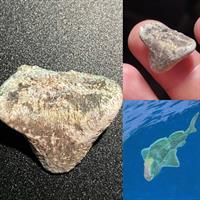SHARK! Mineral Wells Fossil Park visitor makes rare find
11th Annual Crazy Fossil Dig set for Oct. 16
MINERAL WELLS, Texas – Visitors to Mineral Wells Fossil Park typically find and take home varieties of crinoids (sea lilies), trilobites, echinoids (urchins), brachiopods, pelecypods (clams and oysters), bryozoans, corals, trilobites (arthropods), plants -- and sometimes a piece of a prehistoric shark.
That is what happened on Aug. 27 when Los Angeles resident Jeff Parshley visited the fossil park. Parshley was in Mineral Wells as part of a 42-day RV excursion.
“I was there for about four hours,” said Parshley. “We were the only ones there that day.”
Parshley said he was digging and sifting in the southwest quadrant of the sand pit when he found something different. He said he believed it was a tooth. He contacted the Dallas Paleontological Society and was told his find is likely the root of a primitive Petalodus tooth. A Petalodus is a primitive shark.
“They run about 300 million years old I’m told,” said Parshley. “I can’t believe I found it and am so excited!!”
North Texas paleontologist Bob Williams confirmed Parshley’s find. He said shark material of any kind is not among the more common fossils found in any of the Texas sites containing fossils from the Pennsylvanian sub-period.
“These deposits were laid down about as close to 300 million years ago as we can reliably estimate,” Williams said. “An inland sea attached to what we now call the Pacific Ocean reached into this area at that time so any sea creature from that time could be found there. Sharks were at the top of the food chain so were fewer in number than other creatures, but their teeth are sometimes found.”
Williams said finding a root is not quite as exciting as finding the actual tooth, but he said it is still an impressive discovery.
“There's always the chance the rest of the tooth is out there waiting for a new home so collectors should Google images of that genus to see what to look for next time they are at the park,” Williams said.
Williams explained sharks have cartilage instead of bone that do not preserve as well as bone, so teeth and fins are much more common finds than other shark parts. He said a partial brain case was found at a similar site near Jacksboro, Texas, in 2011. It turned out to be from the largest known shark ever found, anywhere, from the whole Paleozoic era.
“That was the time before the dinosaur era, which was in turn before the present era when we had the largest shark, Megalodon,” Williams said.
Pondering about where other remains of his primitive shark might be, Parshley said he is “gonna have to go back and find the rest, I guess.”
Fossil hunters will have a great chance to search for more Petalodus remains and the more common fossils during the 11th Annual Crazy Fossil Dig on Oct. 16, 2021. Held in conjunction with National Earth Science Week Oct., 10-16, the event runs from 11 a.m. to 2 p.m. and will feature members of the Dallas Paleontological Society, fossil displays, hands-on activities and history lessons about the park.
This family event is free to the public, and it’s always “finders keepers” at Mineral Wells Fossil Park. The park is open daily throughout the year. Please note that park rules prohibit shovels, hoes, picks and motorized picks. Dig tools should be no longer than from your fingertip to your elbow.
The park is located northwest of Mineral Wells at 2375 Indian Creek Road, Mineral Wells, Texas, 76067, about two miles north of U.S. Highway 180 West. For more information about the park and directions, go to https://www.mineralwellsfossilpark.com/. You can also find Mineral Wells Fossil Park on Facebook.
Mineral Wells Area Chamber of Commerce
-
David May President/CEO
- September 21, 2021
- (940) 325-2557
- Send Email


